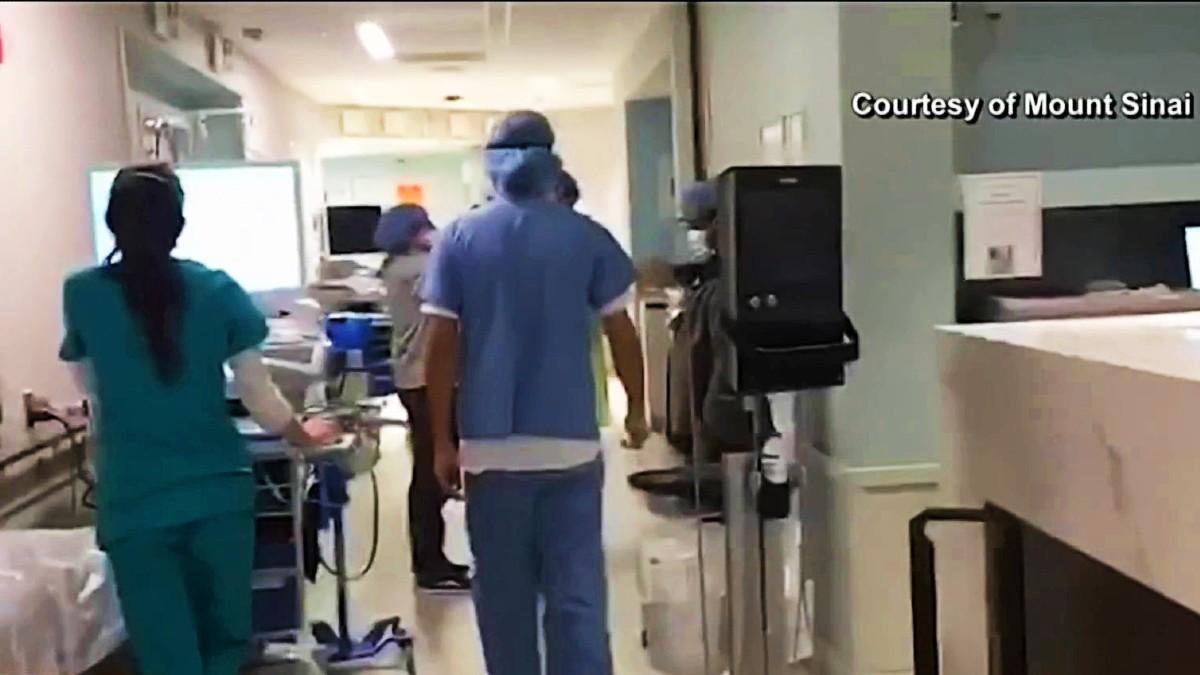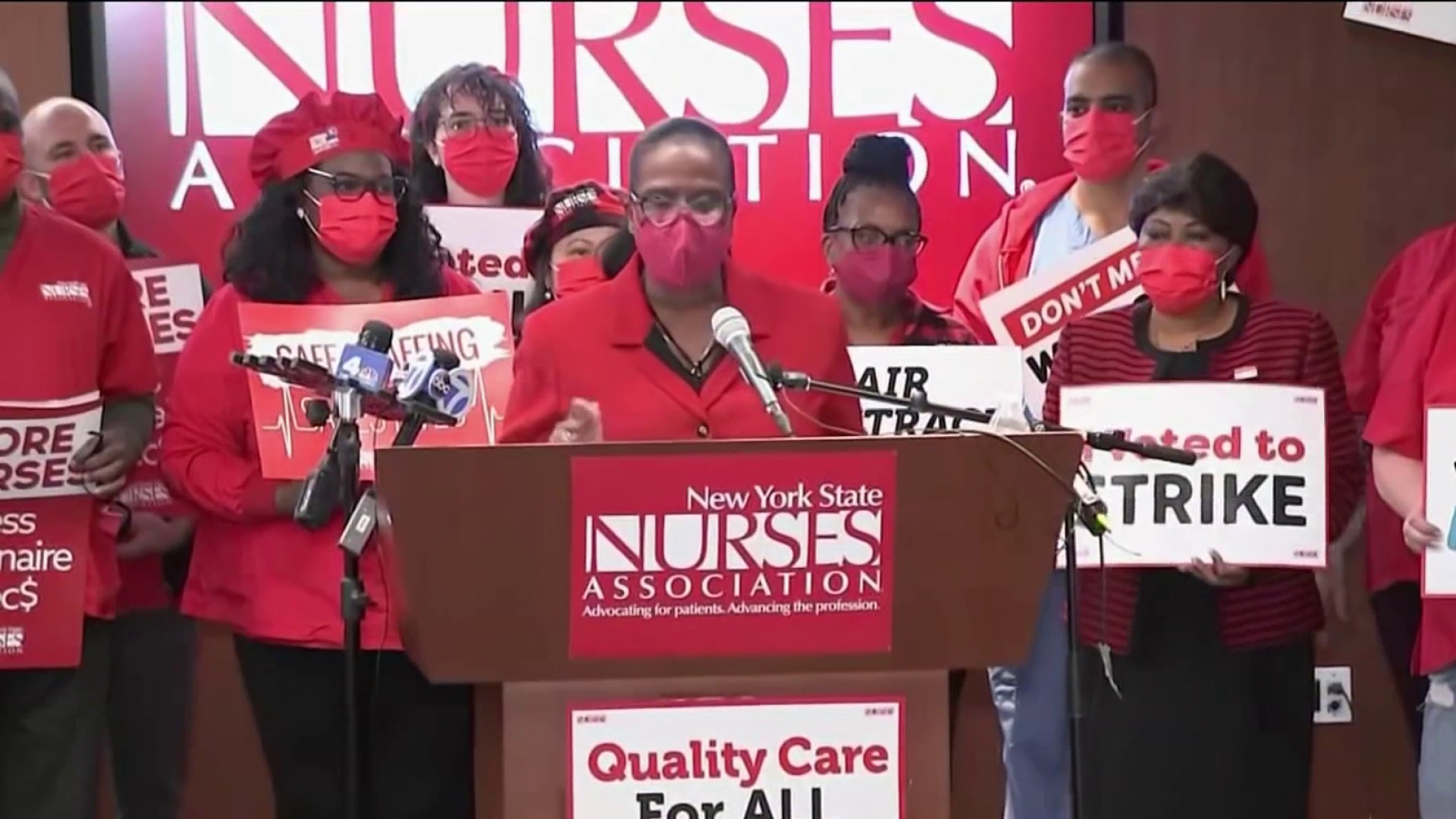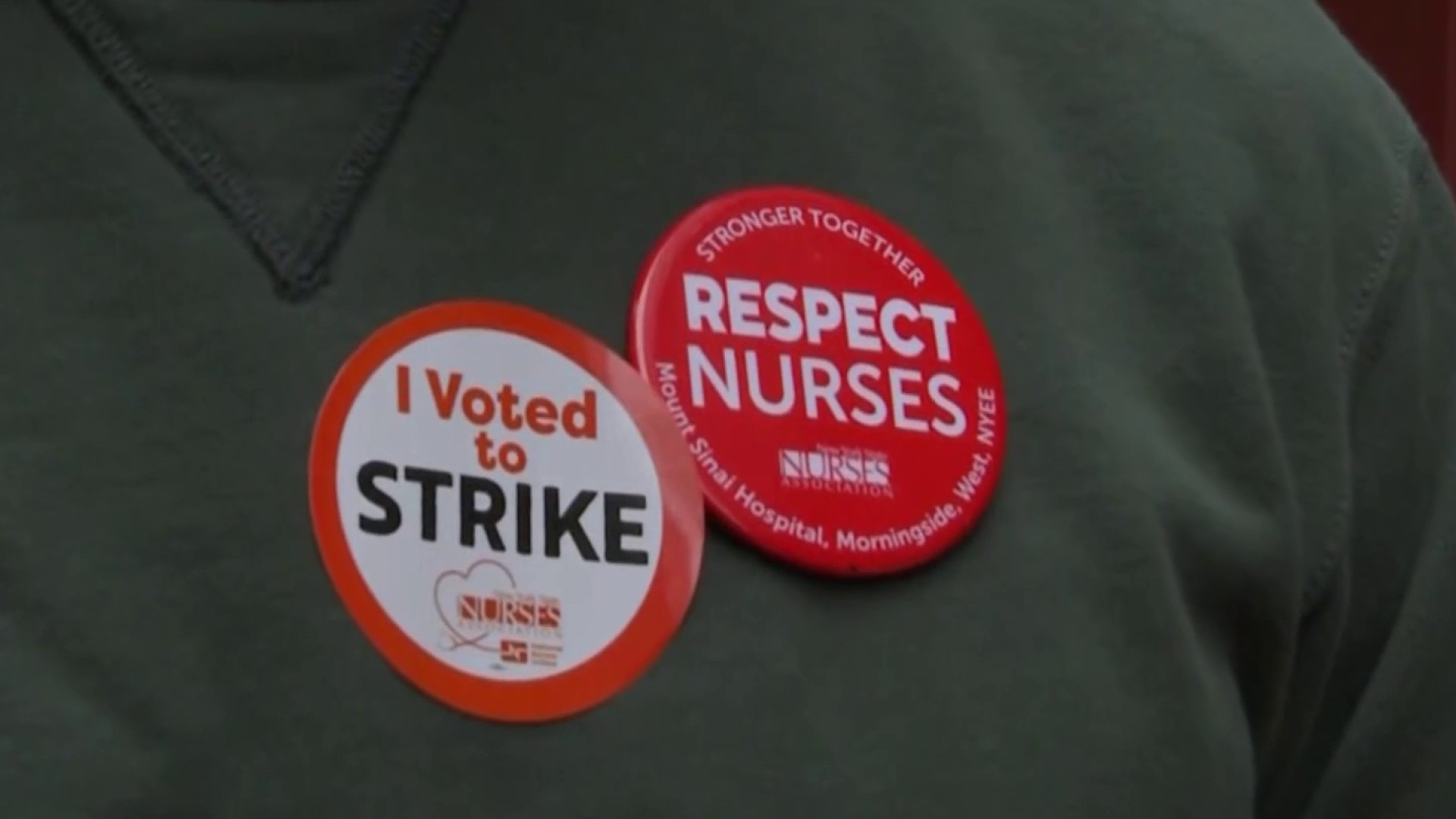A possible nurses strike at multiple New York City hospitals could take place starting the morning of Monday, Jan. 9 — just three days away.
"It could be an enormous public health calamity," Ken Raske of the Greater New York Hospital Association (GNYHA) previously told NBC New York. He has described the mood among hospital managers as "extremely apprehensive," and a strike would send already busy hospitals into full-on crisis mode.
The New York State Nurses Association has more than 9,000 members threatening to conduct strikes at four hospitals where contracts expired on Dec. 31. (Ver detalles en español aquí.)
"Our ERs are backed up, the tripledemic is raging," said Raske. "Even if one hospital would have a strike, it could ripple through the entire system."
Get Tri-state area news and weather forecasts to your inbox. Sign up for NBC New York newsletters.
News of the potential strike comes as the city deals with what is being called a tridemic — simultaneous and serious spikes in infections with COVID, the flu and the respiratory condition RSV. In an effort to keep case numbers down and relieve pressure on hospitals, the city has already issued an advisory (not a mandate) suggesting that people go back to wearing masks indoors.
But what would a theoretical strike mean for you and your health care? Here's what we know so far.
What Hospitals Could See Nurses Go On Strike?
First off, it's important to note that not all NYC hospitals would have nurses go on strike, not by a longshot. A week ago, there were eight private hospitals that were looking at potential nursing strikes. But as of Friday evening, four of those hospitals have come to tentative agreements with their nursing staffs, and would avoid strikes if the unions vote to approve the deals.
Here are the four hospitals where no tentative agreement has yet been reached (as of Friday evening) — meaning a strike is still very much on the table:
- Montefiore
- Mount Sinai Hospital
- Mount Sinai Morningside and West
- BronxCare
Four hospitals have reached at least tentative agreements, which must be voted on by members of the nurses union: New York-Presbyterian Hospital, Maimonides Hospital, Richmond University Medical Center and Flushing Hospital and Medical Center. If approved, those hospitals would avoid a strike. Maimonides ratified their new contract on Friday.
To clarify, just because one hospital were to see a strike, it doesn't necessarily mean the others would too. In theory, nurses going on strike at one hospital wouldn't have any impact on the nurses' decision at another hospital. Each of the hospitals negotiates individually with their own nurses, so depending on how talks go, there could be no strikes at all, a single strike or as many as four strikes.
What Impact Would a Strike Have on Health Care?
For those worried about what a strike could mean on their health care, there are already impacts happening, or very soon will be.
Mount Sinai Health System is beginning to divert "a majority" of ambulances from four of its facilities, and is transferring babies from its neonatal intensive care units to other hospital systems, according to a memo from hospital leadership to staff, a copy of which was obtained by News 4.
Here is a summary of what changes the memo stated would occur soon, as early as Friday:
- Diverting ambulances from Mount Sinai Hospital, Mount Sinai West, Mount Sinai Morningside and Mount Sinai Beth Israel
- Canceling elective surgeries, and scheduling only emergency surgeries at the main and Morningside facilities
- Transferring some patients: "In addition, this - sadly - means transferring NICU babies outside the Mount Sinai Health System to ensure they get the care they so desperately need"
- Discharging "as many patients as appropriate" and shifting services - inpatient care at the main and West facilities, and emergency and child psychiatry at the Morningside campus
A source who works at Mount Sinai said that the parents of the 50+ babies in the NICU did not appear to have been notified yet that their young ones would have to be moved to another facility -- although no babies had yet been transferred as of Thursday evening (in fact, sources said one had been transferred in).
A Mount Sinai spokesperson said that the plan is to move patients on Friday if no deal is in place. As for the other hospitals on the list, it was not immediately clear what contingency plans have already been put into effect or will soon be.
One thing that patients and visitors could expect to see: A lot more travel and trade nurses.
NBC New York has learned that the other hospitals that have not reached agreements with their nursing staffs have already started shelling out tens of millions of dollars in nonrefundable down payments to have traveling temporary nurses on reserve — a huge expense they must shoulder, even if no strikes take place.
The GNYHA said the hospitals having to turn to this more expensive option works against the interest of the nurses in the union because it forces hospitals to spend money that could go to the nurses. However, it also increases the leverage of nurses once the strike notice is issued.
A nurse involved in negotiations estimated the cost of trade nurses is around $10,000 a week, per travel nurse. While the skillset for trade nurses is the same as union nurses, patients who have spent large amounts of time with specific nurses or become familiar with them may have to get used to seeing new faces if a strike were to happen and last for a while.
How Likely Is It That a Strike (or Strikes) Will Occur?
For now, tough to say for certain. It all depends on what the respective hospitals offer the nurses, and if they decide to accept the offers.
NBC New York obtained a memo from the leaders of Mount Sinai Hospital, Mount Sinai Morningside and Mount Sinai West that makes clear most issues in the ongoing negotiations have been resolved — but not all, and the clock is ticking.
Nurses have said that there has been progress at some bargaining tables where hospitals are negotiating with their respective staffs, but not enough progress yet to avoid a strike. The nurses union said there has been at least one sign of progress: All of the hospitals on the list have agreed to not cut health benefits.
"The New York State Nurses Association will rescind a strike notice when we reach a tentative agreement at Mount Sinai that respects nurses and our patients. Not before," said New York State Nurses Association president Nancy Hagans. "There has been some offers and progress but we are not there yet."
According to a source familiar with Mount Sinai's past talks, the hospital had previously offered nurses a deal that included 19.1 percent raises over three years. Management says they negotiated past midnight with the help of a mediator but are still at an impasse over wages. That deal was higher than the one extended by NY-Presbyterian over the weekend.
"It’s not reasonable for NYSNA to ask for a significant wage increase above and beyond these other sites. It’s time for NYSNA to meet us back at the bargaining table and continue negotiating in good faith, so that Mount Sinai nurses can continue providing the exceptional patient care for which they’re known and respected," a Mount Sinai statement said Friday afternoon.
That tentative deal, if accepted, would give nurses at NY-Presbyterian 18 percent raises over the next three years, with added incentives to retain experienced nurses. There was also a promise to address chronic understaffing, which was the union's biggest complaint.
While it remains to be seen whether the nurses at NY-Presbyterian will accept the offer, Montefiore Hospital said Wednesday that nurse representatives at their hospital had rejected a deal that mirrored the one NY-Presbyterian offered. A spokesperson for the hospital said that nurses were offered "an 18 percent wage increase over three years, fully funded healthcare for life, and a significant increase in registered nurses in the emergency departments, among other benefits."
That development may spell trouble for other hospitals given the financial landscape. According to the Montefiore spokesperson, NY-Presbyterian posted $200 million in profits in 2022 while Montefiore posted $200 million in losses. That sort of deal was considered potentially unattainable for other hospitals on the list, but now nurses at NY-Presbyterian may think twice about ratifying the deal they tentatively agreed to (voting began Tuesday night and concludes Saturday).
At least one hospital has ratified their new contract deal with nurses, assuring no strike will take place there: Nurses at Maimonides Hospital approved a new contract with 93 percent of the vote.
Why Are Nurses Threatening to Strike? What Are They Hoping to Get?
"Nurses feel abandoned and disrespected by their bosses," Hagans said. "We held the hands of dying patients, set up last FaceTime calls so dying patients could say goodbye to their loved ones."
Matt Allen, a labor and delivery nurse on the negotiating committee at Mount Sinai, told NBC New York on Monday that there are more than 700 vacancies for nursing positions at Mount Sinai hospitals — something they desperately want to be addressed.
"Staffing is the biggest issue that we're fighting for right now," said Allen. "We're hopeful that we're going to get something this week, before our strike is still on the table."
The union says members are upset about staffing ratios at the local hospitals, contract proposals that they feel dramatically worsen their healthcare benefits (while paying big bonuses to executives), and Mayor Eric Adams' recent move to forcibly hospitalize psychiatric patients. All of those elements have left workers overworked and burnt out.
"We're not able to clean the patient on time, not able to give medicine on time, no breaks," said Allen. "Burnout was real, so we leave the profession and go to work at a travel agency that's going to pay us more."
The average salary for nurses in New York is $93,000, and $98,000 in NYC, the nurses union and GNYHA confirmed. It isn't clear just how much in terms of compensation and raises the union is hoping to get for its members, but it's clear the numbers some of the hospitals have thrown out thus far have not met their standards.
"If Montefiore can afford to pay its executives so much, they can't hardly cry broke when it comes to negotiate a contract with frontline nurses," said Hagans.
Can the Government Step In and Force the Sides to Reach an Agreement?
In short, no. These are private hospitals negotiating with unions, and the government can't do much officially to help avoid a strike.
However, that doesn't mean nothing can be done.
Gov. Kathy Hochul's office has said previously that they are "monitoring the situation." Sources said that both Hochul and NYC Mayor Eric Adams are getting regular daily updates on the talks. While neither Hochul nor Adams have any formal role in the negotiations, some have wondered whether they would step in to apply pressure or try to broker a deal.
Aides to Gov. Hochul confirmed that she has been very engaged for many days, not directly at the bargaining table but speaking to both sides regularly and pushing both sides to get to yes. The state has also started to review the hospitals' strike contingency plans.
"We have been working with all parties to help reach a fair resolution to keep New Yorkers and health care workers safe," Hochul spokesperson Avi Small told NBC New York on Thursday.




